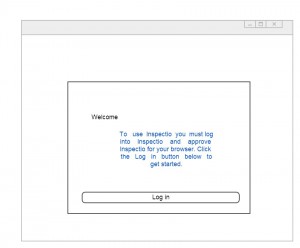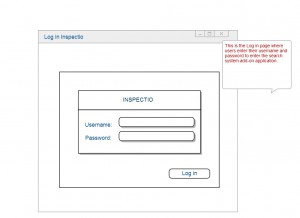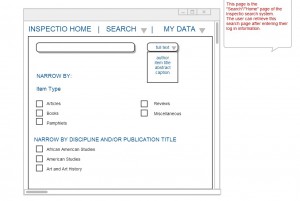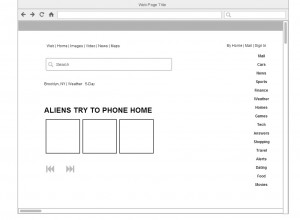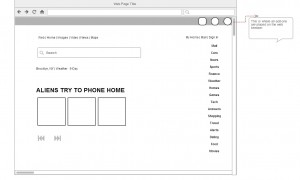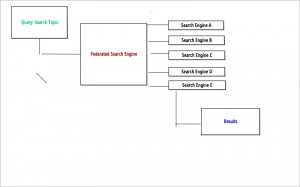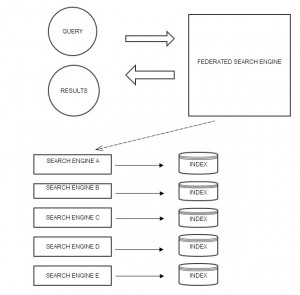[NOTE: More will be added to this document.]
If you could create a research tool what would it be?
The research tool we would create would be a federated search system that includes an add-on application, which attaches to a web browser. An add-on is an accessory device or piece of software designed to increase the capability of a computer or hi-fi system (Webopedia). In other words, it is a small portion of software that adds new features to your installed browser (i.e. Google Chrome, Explorer, Safari, Firefox, etc.)
What would the tool do?
This add-on tool would have the ability to search across multiple databases. The user could conduct keyword searches without the use of “+” [plus signs], or abbreviations such as “and” and “or”.
Who would the intended audience be?
The intended audience for this research tool would be college/university students looking for an alternate route to traditional database searching. Users “have stopped using resources because they are frustrated by the number of dissimilar search interfaces they must use to access database content (Warren, 262)”
How would it be different from the research tools we’ve worked with this semester?
In comparison to the CUNY CityTech library database system, and Google, this search program would produce the same results in less time than the traditional route.
In choosing which search tool (Google or Federated) is the best, student opinion is equally divided (Georgas, page number needed). In short, student preference for Google is due to familiarity and ease of use, and student preference for Federated is due to more scholarly results, and citations provided. Additionally, some other search tools of possible merit have been omitted from the research of student preferences surveyed.
Certainly both tools have their advantages and disadvantages. Perhaps combining the best features of both into one tool might be worthwhile. A feature that could potentially be added would be the ability to “vote down” a search result which is deceptive or fraudulent. At present, a researcher might click on a Google result, only to find that the page which loads has nothing to do with the subject desired. But the site has gained the “click” or hit on the page, and while the researcher may be angry that her time was wasted, there is nothing that she can do to remove the click and vote the site down in the search engine results. A similar situation is found where the click results in the loading of a page which offers the results only if paid for, usually at an exorbitant price. Again, the researcher’s time has been wasted, and the “payware” site has its click. I would like to see Google having a little pop-up window which would ask the user, “Was this site helpful? Yes, or No.” The researcher could then vote “no” on the fraudulent or payware site, and vote its search engine ranking down, until it no longer appears high in search engine rankings to waste the time of busy researchers.
How would it make doing research easier, faster, or more enjoyable?
This add-on tool “will allow users to search a range of databases simultaneously” (Warren, 259). And “it will present results to the end user sorted by relevance, with duplicate records merged and independent of the sources they are drawn from” (Warren, 263). Users would be able to make searches across a wide range of databases that would be categorized by subject/category. “Metasearching removes the need for the user to spend additional time choosing databases that seem relevant and searching them individually” (Herrera, 45).
How would it help solve commonly encountered difficulties with research?
A user would be able to do an academic search by categories listed in the system. “Categories contain subcategories, and subcategories contain resources” (Xu, 236). The category labels would match academic disciplines found in traditional college/university settings. The distribution of information by category could help users sort through sources faster. Some databases would fall under more than one category increasing the probability of reliable information being sought out.
What would the tool look like?
A two page model will be made and elaborated on.
Could it be a mobile application?
Yes and no. A mobile application is meant to be a condensed version of a website, which runs on smartphones, tablets and other electronic devices that have internet capabilities. If there are too many features to work through then the application becomes instantly forgotten and/or deleted. This type of search system could work if the interface is seamless and user friendly.
WORKS CITED
Georgas, Helen. Google vs. the Library: Student Preferences and Perceptions When Doing Research Using Google and a Federated Search Tool. Libraries and the Academy. 13, 2. 2013:165-185. Project MUSE. Web. Apr. 2013
Herrera, Gail. MetaSearching and Beyond: Implementation Experiences and Advice from an Academic Library. Information Technology and Libraries [FINISH CITATION]
Warren, Dennis. Lost in Translation: The Reality of Federated Searching. AARL 38, 4. 2007: 258-269. EBSCO. Web. Dec. 2007.
Webopedia. QuinStreet Corporate Headquarters. Unknown update, Web. 6 May 2014.
Xu, Fei. Implementation of a Federated Search System: Resource Accessibility Issues. Serials Review 35,4. 2009: 235-241. EBSCO. Web. 2009

